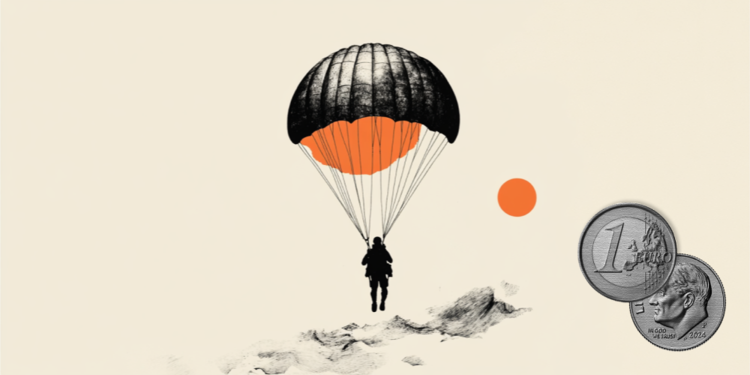Shanghai, China’s most populous city, is undergoing a strict lockdown. The city has broken consecutive records for Covid-19 infections, and the local government has stipulated controversial measures, such as the separation of parents and children who test positive for the disease – a measure revoked after poor reception from the inhabitants.
Brazilians Rodrigo Zeidan, professor at New York University Shanghai, and Melissa Nogueira, language professor, told CNN their experience during the isolation imposed by the Chinese government. Read the story:
“I’ll dig through the apps while you manage WeChat groups, okay?”
“Closed.”
The division of labor is essential amid the world’s toughest lockdown. We are modern hunter-gatherers from a privileged position in a high-rise building in Shanghai’s Pudong district.
At first, we spent half our days shopping for food and drinks. Now it’s two hours a day. We eat what we can, but we don’t run the risk of running out of essentials like water, soap, and staples.
We wonder if this is similar to our experience growing up under hyperinflation in Brazil in the early 1990s or if it’s just our minds playing tricks on us. But back to reality. There are mangoes to last a few months – 25 kilos of the fruit, to be precise.
China is facing its first significant outbreak of Covid-19 in two years, leading to the lockdown of several cities by government order as part of its uncompromising Covid-19 strategy. The main hotspot is Shanghai, China’s financial center of 25 million people, our current home adopted for the past six years and where we still plan to live for the next 40.
A year ago, everyday life struck a balance. Life has returned to normal with two exceptions: we must wear masks when using public transport and in certain government buildings, and any news of a single case of Covid-19 in the city spreads like wildfire.
Everyone was aware that if anyone in their community tested positive for Covid-19, a targeted lockdown would ensue. It would last 14 days in the places where the case was found and two days in the places where the person passed (as long as everyone tested negative for two consecutive days).
Still, with monthly cases in single digits, we never found anyone who was locked up. That changed earlier this year as cases started to rise and places were closed more often.
In mid-February, when cases started to rise in Shanghai, people were asking themselves before going anywhere, “Does the place have toilets?” (People who were locked in a department store were given buckets as there were no facilities)? Have an open space? Have there been any confirmed cases nearby?” People would try to avoid the risk of lockdown at all costs and at the same time be prepared for the worst.
That meant carrying a bag of toiletries, a change of clothes and essentials for the office in case of a spontaneous blockage.
On March 10, amid growing cases, our eleventh grade son’s school informed us that it was switching to distance learning. New York University Shanghai, where Rodrigo teaches, did the same soon after.
We could still go out, and everything was open. But we decided to avoid crowds and even public transportation – no basketball, tennis or happy hours. The city was still a living organism, and our three-bedroom apartment has plenty of space. Many people, especially migrant workers, are not that lucky.
After a day or two of this, we chose to self-isolate. We didn’t want to risk being sent to a centralized quarantine or being stuck in a makeshift lockdown at a department store or restaurant. We feel a complete shutdown coming on.
It’s happened before, seeing cases rise as authorities delay the inevitable, in Spain and Brazil in 2020. What we didn’t know was that the Shanghai version would include closing deliveries, supermarkets and grocery stores.
On March 24, we woke up to the building’s WeChat group buzzing with the news that our complex had a resident who had tested positive for Covid-19. The entire 18-building complex would be closed to the outside world for at least 15 days.
The specific building where the person lived would be sealed off, and residents there would not be able to leave unless it was a medical emergency.
As residents of other buildings were still allowed to use the shared areas of the complex, some of our neighbors set up tents and a picnic table on the central lawn where people gathered, exchanging snacks and laughter, with children playing everywhere. No one could leave, but life wasn’t so bad in our community.
The worst was yet to come. On March 27, Shanghai instituted a staggered lockdown. Pudong, east of the river where we lived, was closed first. Then Puxi, in the west, five days later. In Puxi, families have swept away grocery stores and supermarkets, leaving almost nothing in their wake.
We didn’t have that chance to buy in bulk. Not our neighbors. The rigor of the blockade caught us unprepared, with no time to stock up. We switched to survival mode.
It helps that we are both children of Latin America’s hyperinflation. Overnight, our minds raced to the lessons learned from Brazil in the early 1990s. Back then, spending the monthly salary as quickly as possible was the norm. As prices could rise by 10% or more each month, every month there was no point in saving money. Do you have any money in your pocket? Spend it all before it loses all its value.
So stocking up on food was a recurring family adventure, where the goal was to spend every penny, ensuring the food would last until the next paycheck arrived. Families shared lessons on how to preserve food in bulk and use the same ingredient differently.
Then, as now, there was no point in getting depressed about our situation. Our mantra was “do what you must and control what you can”.
The first hurdle of Shanghai’s severe lockdown was surprisingly easy to overcome. A neighbor helped us communicate with the community manager, who coordinates with official authorities the evolving rules and regulations that each community must follow.
We got a special dispensation to go to the nearby clinic to get medication for continuous use. We have a bicycle, which is useful when people are afraid of community spread indoors like cars or buses, and we are considered responsible neighbors.
However, food and drink turned out to be a much more significant obstacle. A few small restaurants delivered, but usually only one or two dishes. One of us would spend countless hours ordering anything that became available that looked edible. There was no news about government food packages; we received two, more than a week apart and while welcome they would not cover all our needs.
We turned to the complex’s group chat for support. The community came together to coordinate bulk purchases directly from producers. For each category, there was a group chat: fruits, vegetables, rice, eggs, milk, etc. Without Google Translate and a helpful neighbor who speaks perfect English, it would have been much more difficult to navigate.
Sometimes the groceries arrived. Other times, no. Minimum order limits varied widely. We ordered mangoes and strawberries. They arrived. Beautiful and tasty fruit, but what do you do with 25 kilos of mangoes, 6 kilos of strawberries and 10 kilos of rice for three people?
Out of all the anxiety and frustration, there was an upside. The community came together. We lend kitchen knives and donate salt; a neighbor dropped ten apples from her 35 pound purchase of Golden Delicious. We all contributed to some families who were short of basic food.
Finally, some reliability. We connected, first through a Chinese app and then directly, with one of the few couriers allowed to roam Pudong. We give you a good tip to buy what’s available around here. The selection is stark, but we didn’t care. We’ve experienced much worse things in Brazil.
One day we woke up to a loud knock on our door. We were scared as it could mean that one of us would be taken to a quarantine facility. Opening the door, people in protective suits. Our hearts skipped a beat. Fortunately, they were there to deliver rapid antigen tests.
While things are slowly improving, there is no end in sight to the lockdown. A community is released when 15 days go by without anyone testing positive. As cases have not peaked yet, we anticipate a few weeks before we can move freely.
Is it 1991? 2020? 2022? Frankly, sometimes we wonder. But it does not matter. Our hearts go out to migrant workers and families experiencing real hardship. We are safe, with enough to eat, and we have a fully stocked library. We have plenty of space in a high quality complex where we have everything we need but not everything we want.
There are many ways to relive childhood. Who would have chosen this one? There will be a time for complaints, but now: “Do what you must and control what you can”.
Source: CNN Brasil
I’m James Harper, a highly experienced and accomplished news writer for World Stock Market. I have been writing in the Politics section of the website for over five years, providing readers with up-to-date and insightful information about current events in politics. My work is widely read and respected by many industry professionals as well as laymen.







